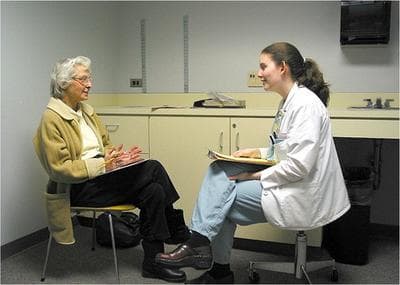Advertisement
Goal-Oriented Care: When Patients Decide What 'Better' Feels Like

The piece touts the virtues of goal-oriented care, that is, when patients, rather than doctors or researchers, express their own ideas about what 'better' health outcomes might be given their medical condition and life priorities. One example: A patient with Parkinson's might feel that it's more important to attend a grandchild's graduation than to reduce his tremors, and so focus on that goal as a priority.
The authors, David B. Reuben, M.D., Division of Geriatrics, David Geffen School of Medicine at UCLA and Mary E. Tinetti, M.D, Department of Medicine, Yale School of Medicine, elaborate:
...a person with Parkinson's disease may establish goals for symptoms, such as decreased rigidity and no falls; goals for functional status, such as the ability to get to the bathroom without assistance although requiring a walker; and goals for social function, such as the ability to use the Internet to communicate with a grandson at college and the ability to go to church. However, the patient may not be aiming to reduce tremor, walk without a walker, or continue to work for pay. Alternatively, he or she may prioritize being as mobile as possible even at the expense of medication-induced dyskinesia and mild confusion.
Historically, the quality and success of medical care has been assessed without necessarily incorporating this patient perspective, the authors write. Rather, measures such as disease-free survival, hypertension control and initiation of appropriate medication after a heart attack are more typical markers of "success." All of those are good, but may not be truly aligned with what a patient hopes for.
The authors cite three reasons why this goal-oriented approach is, ultimately, the better path:
--First, it frames the discussion in terms of individually desired rather than universally applied health states. For example, a new therapy may extend life for patients with metastatic prostate cancer for several months, on average. Yet a particular patient may not perceive this small gain as worthwhile. Similarly, extended physical therapy may enable a patient with a fractured hip to transition from needing an assistive device to walking independently. But the patient may perceive the work required to make this transition as too hard and the amount of gain as not worth the effort.
--Second, this approach simplifies decision making for patients with multiple conditions by focusing on outcomes that span conditions and aligning treatments toward common goals. Choices to deescalate treatment for one condition in order to optimize treatment for another can be made in the context of whatever therapy is most likely to achieve the patient's goals. For example, a patient with hypertension and postural hypotension may opt to forgo blood-pressure–lowering treatment in favor of being able to walk with less fear of falling, with a resultant gain in short-term function. Since success or failure in attaining these individualized outcomes is easily determined, it's feasible to use goal attainment to assess treatment effectiveness and quality of care for people with multiple chronic conditions...
--Third, goal-oriented care prompts patients to articulate which health states are important to them and their relative priority. Thus, patients can be in control when treatment options require trade-offs (e.g., better symptom control at the expense of potentially shorter life span). Such trade-offs are currently made, for example, when patients choose to receive hospice care and decline aggressive treatment of their medical conditions.
This program aired on March 1, 2012. The audio for this program is not available.
